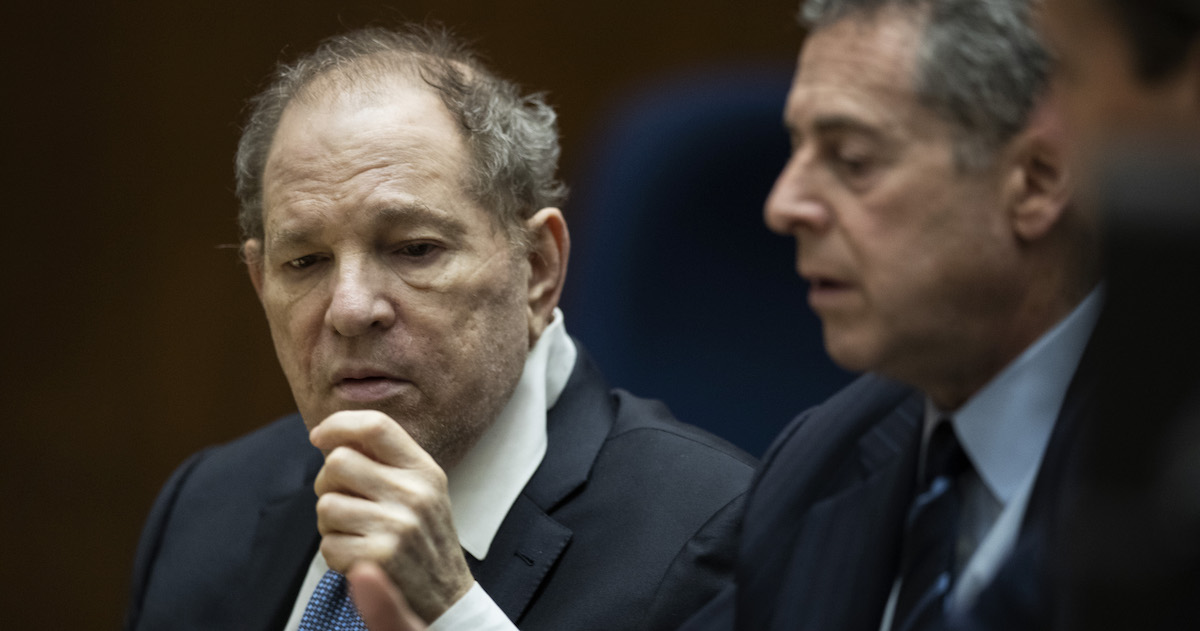
Former film producer Harvey Weinstein (L) interacts with his attorney Mark Werksman in court at the Clara Shortridge Foltz Criminal Justice Center on October 4, 2022 in Los Angeles, California.
Disgraced Hollywood producer Harvey Weinstein has been confined to an “unsanitary, fetid” courthouse holding cell for three or four hours after trial before being taken back to jail, his lawyer said Tuesday, and his health may become an issue because of it.
“It’s almost medieval, the conditions,” defense lawyer Mark Werksmen told Los Angeles County Superior Court Judge Lisa B. Lench this morning. “I’m worried about him surviving this ordeal without a heart attack or stroke.”
Lench said she’d talk to deputies about it but, “I’m just not sure there’s a lot to be done.” The judge later said the courthouse doesn’t have “an excess of wheelchair vans to come pick him up when he’s ready.”
Werksman raised the issue again after Weinstein was brought into the courthouse about 10:30 a.m. in a dark blue or black suit and blue tie. He effortfully climbed from his wheelchair into a seat at the defense table before Werksmen submitted letters from doctors to the court to support his argument that the current holding cell conditions are unacceptable.
The judge took issue with a suggestion that Weinstein doesn’t have access to toilet in the holding cell, saying, “He’s not deprived of a toilet. There is a toilet in the cell.”
“I’m not going to let the record reflect that he’s deprived of a toilet,” Lench said, according to a pool report from The Associated Press. Werksmen said he didn’t mean to suggest there wasn’t a toilet, rather, the one in the cell is “medieval,” “unhygienic” and “virtually unusable.”
Meanwhile, Weinstein and his lawyers were the only people in the courtroom not wearing masks.
The discussion about the holding cell marked the second day of jury selection in Weinstein’s criminal trial in Los Angeles County Superior Court, in which he faces 11 sexual assault related charges for alleged attacks on five women between 2004 and 2013.
Prospective jurors were summonsed to the Clara Shortridge Foltz Criminal Justice Center in downtown Los Angeles to fill out written questionnaires in groups of 75 each day, with 67 making it in on Monday and 11 being excused after private discussions with the judge. The other 56 were ordered to return next Tuesday, Oct. 18.
Today’s group was nine short because of eight no shows and and a sick person who was sent home, but five people who were due Wednesday showed up a day earlier, so 71 prospective jurors total filled out questionnaires. They were brought into court about 10:30 a.m., 10 minutes after Weinstein. He didn’t attempt to stand as he did Tuesday, but as his lawyers introduced him, he said “Hi everyone.” He later conversed with a deputy while alone at the defense table as his lawyers went into the jury room to discuss possible juror excusals with the judge and prosecutors.
Lench ended up excusing 15 people, with the remaining 56 ordered to return Monday at 1:30 p.m. Another group of 75 is due at the courthouse Wednesday morning.
Opening statements are expected the week of Oct. 24. Weinstein faces 11 sexual assault related charges. One of the accusers is Gov. Gavin Newsom’s (D) wife, Jennifer Siebel Newsom. Two others are represented by famed victims rights lawyer Gloria Allred, who told Law&Crime she also represents a woman who will testify about an alleged assault by Weinstein that has not led to a criminal charge but can be considered by the jury as a prior bad act.
Jurors in the New York trial heard similar testimony, including from a woman represented by Allred who is a charged victim in the Los Angeles case. Another client has never done spoken publicly about Weinstein “and nobody knows her name except us,” Allred said.
“Some of them may never have testified in a court of law before, a criminal or civil case. But they have their right to their day in court,” Allred said. “Even if he’s been convicted elsewhere, they should have that right.”
Allred represented victim Mimi Haley in the New York trial, for whom Weinstein is serving 20 years in prison for sexual assaulting. Weinstein is serving an additional three years for third-degree rape. Allred emphasized that Haley is not an A-list actress but a production assistant.
“You don’t have to be an A-list actor to win justice,” Allred said.
Allred said the lack of cameras inside the courthouse will be a good change for victims compared to the Manhattan trial that included courthouse hallway lined with cameras. “They don’t have to go through a throng of cameras to get to the courtroom. Can you imagine doing that and then suddenly taking the witness stand to testify? Not easy,” Allred said. She said the Los Angeles trial will have “a calmer atmosphere.”
“I’m sure it’s still nerve-racking for many people who have never testified. But definitely much better from the point of view of a witness,” Allred said. “Still, juries are unpredictable. Sometimes they believe everybody. Sometimes they only believe some and sometimes they don’t believe anybody. There’s no way to predict what’s going to happen here except to say we know there’s going to be testimony, the charges that were filed are going to be challenged, and we’ll see what the jury decides.”
This article is compiled in part from a pool report organized by The Associated Press. Today’s report is by AP writer Andrew Dalton.
[Image: Photo by Etienne Laurent-Pool/Getty Images]